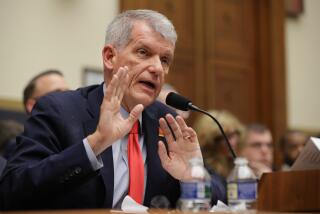Wells Fargo fired a worker for refusing to scam customers, lawsuit says

A New Jersey woman has sued Wells Fargo Bank, saying she was fired for refusing to participate in a scheme to manipulate accounts and sell products that weren’t in customers’ best interest.
Melinda Bini filed a lawsuit in state court in New Jersey on April 5 against the bank and three supervisors from the branch she worked at in Highland Park, NJ.com reported.
In the lawsuit, Bini accused her superiors of running or knowing about the scheme and says she was retaliated against and later fired for refusing to participate. Bini, a former assistant vice president and regional private banker, is seeking her job back and damages.
In September, San Francisco-based Wells Fargo & Co. agreed to a $185-million settlement with Los Angeles City Atty. Mike Feuer, the Consumer Financial Protection Bureau and the Office of the Comptroller of the Currency after employees were found to have created as many as 2 million checking, savings and other accounts in customers’ names without those customers’ knowledge or consent.
The tactics, blamed on onerous sales goals, were first uncovered by the Los Angeles Times in 2013.
Kevin Friedlander, a spokesman for the bank, said the company doesn’t tolerate retaliation against employees who express their concerns.
“Our nonretaliation policy makes clear that no team member may be retaliated against for providing information about suspected unethical or illegal activities or possible violations of any Wells Fargo policies,” Friedlander said.
Friedlander said the supervisors are still employed, but he wasn’t able to comment further on the allegations because it was an ongoing legal matter.
The scandal over the unauthorized accounts led to last year’s resignation of John Stumpf, Wells Fargo’s chairman and chief executive, and the early retirement of Carrie Tolstedt, the head of the community banking division.
More than 5,000 bank workers also lost their jobs over unethical practices, which prompted some lawmakers to chide the bank for firing low-ranking, front-line workers while regional and national executives kept their jobs.
In early March, Wells Fargo said it would cancel bonuses and revoke millions of dollars in compensation from eight top executives, including Tim Sloan, who succeeded Stumpf as CEO in October. The bank also eliminated sales goals for front-line workers as a part of a reform of its incentive compensation system.
In a long-anticipated report released last week, the bank pinned the blame for the scandal on weak corporate oversight, calling out Stumpf and Tolstedt. It also said it would take back more than $47 million in pay from Tolstedt and $28 million from Stumpf.
Times staff writers James Rufus Koren and James F. Peltz contributed to this report.
ALSO
Here’s one way driverless cars will change urban development
Trump’s plan to privatize air traffic control has benefits and pitfalls
Nuclear energy was once considered a key part of America’s future, but the industry is struggling
UPDATES:
8:35 a.m.: This article was updated with background information about Wells Fargo’s accounts scandal.
This article was originally published at 6:45 a.m.
More to Read
Inside the business of entertainment
The Wide Shot brings you news, analysis and insights on everything from streaming wars to production — and what it all means for the future.
You may occasionally receive promotional content from the Los Angeles Times.










